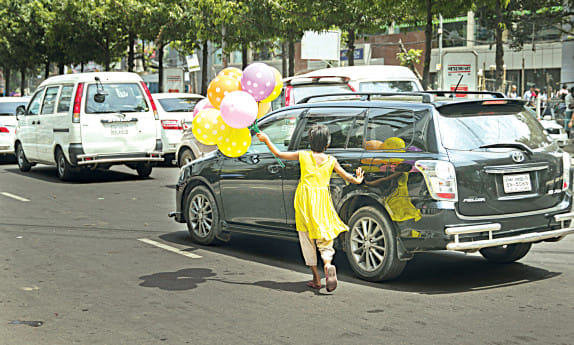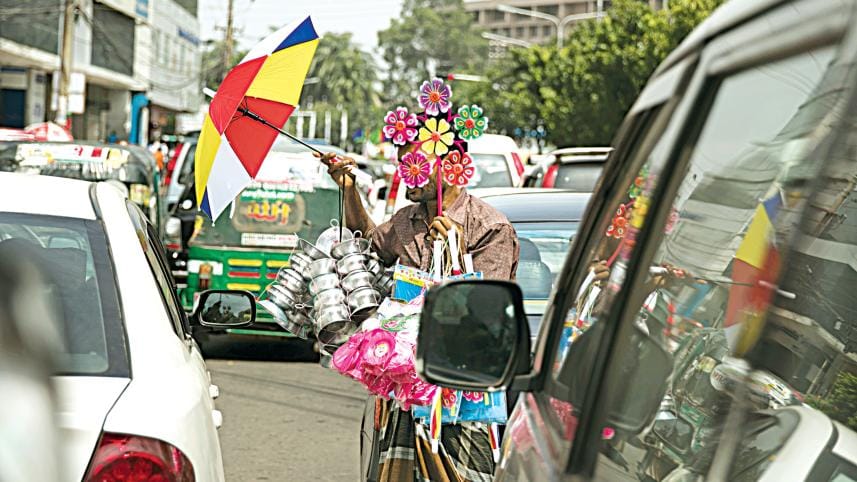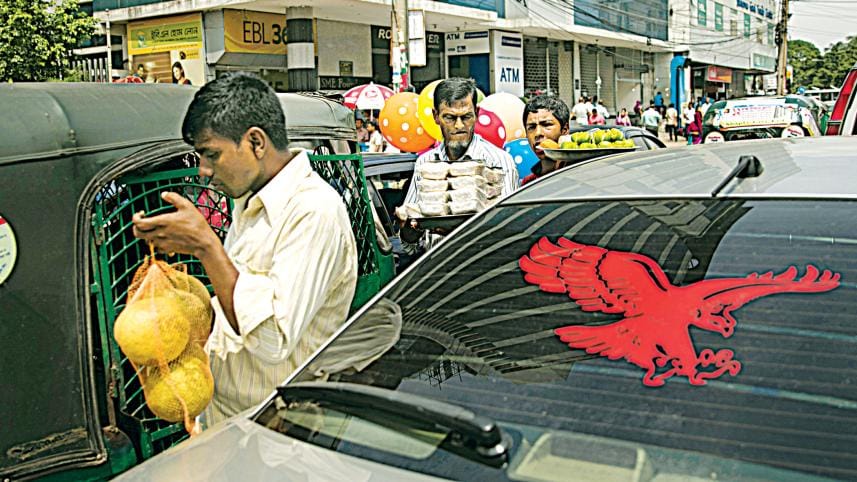Dhaka’s Signal Economy

Often, on my way to the office from Dhanmondi to Mohakhali, I pass through at least three or four major traffic signals -- the stubborn standstill at Dhanmondi 27, the long, impatient pause at Khamarbari, and the inevitable gridlock at Farmgate. However, it does not end there. The legendary bottleneck at Bijoy Sarani awaits, followed by the guarded patience required at Jahangir Gate. And if luck chooses to mock me, as it often does, the Mohakhali Railgate signal delivers the final blow.
So yes, wedged between the relentless chorus of horns and the glow-stick rave of brake lights, I have cultivated an oddly fascinating pastime -- calculating the city's "invisible" GDP -- the minutes we waste subtracted from the minutes gained by the signal vendors who spring into action the moment the signal bleeds red!
Within those few minutes, or sometimes hours, of a red light or VIP signal, you can buy roses, sunglasses, tea towels, phone chargers, balloons, peanuts, cold water, "original" Ray-Bans, and occasionally, moral guilt.

Welcome to what I call the Signal Economy!
Here, while most of us lose precious time, a few cleverly turn those lost minutes into opportunity and profit. I am sure all of us have encountered them. Some, to me, are true lifesavers -- selling cold water or juice on a sweltering summer day, they appear like angels out of nowhere. And then, of course, there are others -- those who feel more like a nuisance, testing the limits of our already diminishing patience.
"It's my office," says Manik with a grin on his face while balancing a mountain of tissue packets in his hands near Dhanmondi 27. The teenager adds, "The longer the signal, the better the business."
In Dhaka, the signal is not a stop. It is a stage. And the performers are these sellers -- of all ages! This is a setup that I am sure no marketing team could ever dream of. The products are seasonal, tactical, and as adaptive as Dhaka's weather. During summer, they sell sunglasses and water bottles. During the monsoon, umbrellas and plastic shoe covers emerge like magic!
And sometimes, no matter the season, if you are packed inside a sweaty, overburdened bus, brace yourself. Sooner or later, a vendor will weave through the crowd, waving a tiny miracle -- a 10-taka tablet that claims to cure everything from migraines to heartbreaks, putting even the best doctors to shame!

If you listen long enough, you will be half-convinced that it might fix your headaches, your heartbreaks, and maybe -- just maybe -- your stubborn bachelorhood too.
"We sell what the eyes want," says Liton, a man offering "designer" mobile covers near Farmgate. "If your face says you are tired, I will show you a stress ball. If you look romantic... a flower for you!" he winks. Clearly, a man who has mastered microeconomics in its rawest form.
There's a certain choreography to it too -- a glide between cars, a delicate tap on the window, a quick smile, a flash of the product, and a retreat if the driver scowls. This is salesmanship under pressure, with a moving, impatient audience and a ticking clock.
Then, of course, Dhaka being Dhaka, the gig economy is not always "legal" nor "organised". But it is efficient. Sellers need patience, agility, and a sharp sense of who might roll down a window and who will look away. Authorities sometimes crack down, clearing intersections, but like every underground market, the sellers return -- new faces, new tricks, same survival story.
At a certain level, it's hard not to admire the sheer hustle. No one taught these entrepreneurs about pricing, supply chains, or customer retention. Yet, here they are, running a parallel economy under the nose of an impatient city, turning every red light into a flash sale.
So, the next time you are stuck at a traffic stoplight, maybe, just maybe, buy a packet of tissues or a flower. It's not charity. It's the small price of admission into Dhaka's liveliest street theatre.




 For all latest news, follow The Daily Star's Google News channel.
For all latest news, follow The Daily Star's Google News channel.
Comments